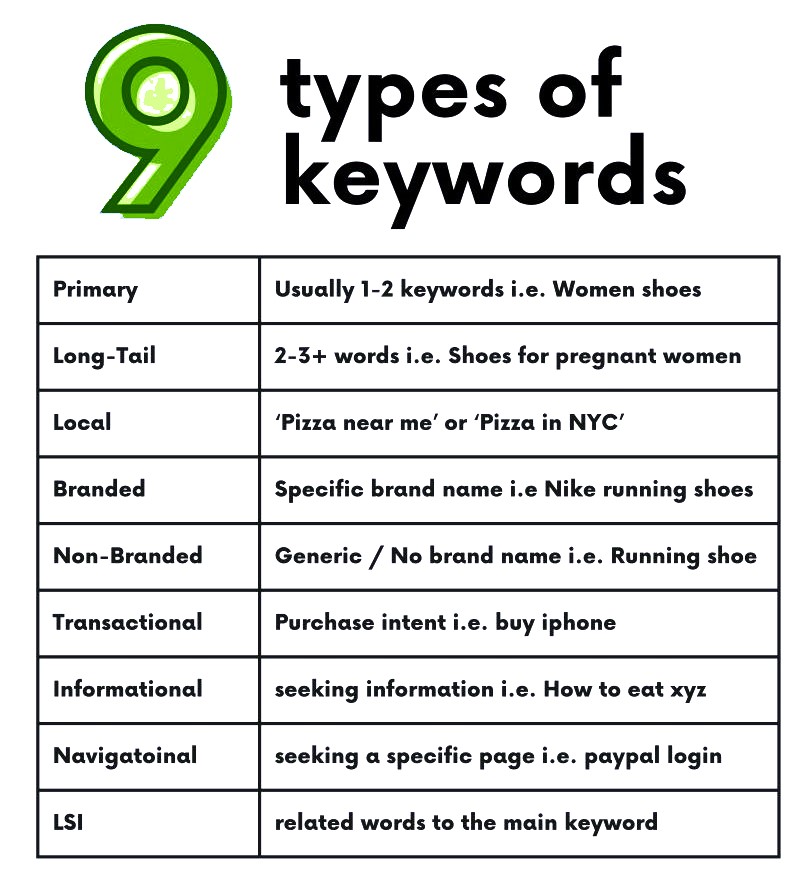In the digital realm, where the battle for online visibility is fierce, understanding the intricate world of SEO keywords is the key to success.
Keywords are the building blocks of your search engine optimization strategy, and knowing how to wield them effectively can make all the difference in your online presence.
In this comprehensive guide, we’ll delve deep into the nine types of SEO keywords you must master to conquer the competitive landscape and boost your website’s rankings.
Short-Tail Keywords: The SEO Titans
Short-tail keywords, often referred to as “head terms,” are the juggernauts of the SEO keyword world. These are typically one or two words in length, like “SEO” or “digital marketing.” While they boast massive search volumes, they also come with intense competition.
Ranking for short-tail keywords is like trying to scale Mount Everest – challenging but immensely rewarding.
Long-Tail Keywords: The Niche Explorers
Long-tail keywords, on the other hand, are the savvy adventurers in the keyword kingdom.
These phrases are longer and more specific, such as “best SEO practices for e-commerce websites” or “how to optimize content for voice search.” While they may have lower search volumes, long-tail keywords often lead to higher conversion rates because they precisely match what users are looking for.
LSI Keywords: The Contextual Companions
Latent Semantic Indexing (LSI) keywords are the linguistic detectives of SEO.
They are semantically related to your primary keyword and help search engines understand the context of your content.
Including LSI keywords in your content enhances its relevance and authority, signaling to search engines that your content is comprehensive and valuable.
Branded Keywords: The Identity Beacons
Branded keywords include your brand name or variations of it.
Optimizing for these keywords is essential for establishing and maintaining your online identity and authority.
Branded keywords serve as your digital calling card, making it easier for users to find you specifically.
Competitor Keywords: The Strategic Insights
In the world of SEO, keeping an eye on your competitors can yield valuable insights.
Identifying and targeting keywords that your competitors rank for can provide you with a roadmap to success.
It’s like learning from the best in the business and capitalizing on opportunities they may have missed.
Transactional Keywords: The Conversion Catalysts
Transactional keywords are the secret sauce for driving sales and conversions.
These keywords indicate user intent to take a specific action, such as “buy SEO software” or “download SEO ebook.”
Crafting content optimized for transactional keywords can significantly boost your ROI and lead to a tangible impact on your bottom line.
Informational Keywords: The Educators
In the digital age, information is a currency of its own.
Users frequently seek information online, from “how to tie a tie” to “how to improve SEO rankings.”
Creating informative content that answers these queries not only attracts users but also positions you as an expert in your field, building trust and credibility.
Navigational Keywords: The GPS for Your Website
Navigational keywords help users find a specific website or page, such as “Facebook login” or “OpenAI blog.”
Optimizing for navigational keywords ensures that users can easily locate your digital destination, improving the user experience and driving more traffic to your site.
Geo-Targeted Keywords: The Local Connectors
If your business caters to a specific location, geo-targeted keywords are your best friends.
Keywords like “SEO services in New York” or “best pizza in Chicago” draw local customers to your doorstep.
Optimizing for geo-targeted keywords can be a game-changer for businesses looking to tap into local markets.
Conclusion: The Keyword Kingdom Awaits
In the realm of SEO, keywords are your trusted allies, guiding both search engines and users to your content.
By mastering the various types of keywords and aligning them with user intent, you unlock the gates to SEO success.
It’s not just about ranking for keywords; it’s about delivering value to your audience.
As you navigate the ever-evolving SEO landscape, remember that keywords are your compass.
They help you chart a course towards higher search engine rankings, improved user experiences, and increased online visibility.
Keep exploring, experimenting, and optimizing your content, and watch your digital presence flourish in this dynamic online world.
Stay tuned for more SEO insights, and follow our blog for regular updates on mastering the art of SEO.
Your journey to SEO mastery has just begun, and the Keyword Kingdom awaits your conquest!








